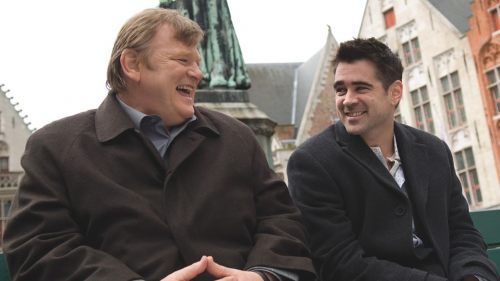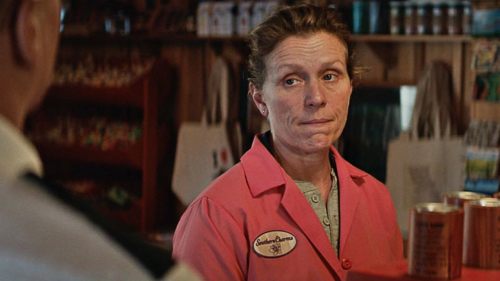Finding Nuance Within Extremes In THREE BILLBOARDS OUTSIDE EBBING, MISSOURI
Get your tickets to Three Billboards Outside Ebbing, Missouri here!
Martin McDonagh’s latest has the texture of a real story. It tackles real subjects using real characters, and it presents its goings on in a stripped-down, visceral manner. It never presents itself as a “true” story, only a real one, but its narrative takes it places that feel outside the realm of reality. These are not the kind of characters you’d ever call inauthentic, but there may come a point (should “realism” be your only yardstick) where you throw your hands up and say “Nah, this would never happen in real life.” And that’s true, to a degree. Such an audacious confluence of scenarios will likely never come to pass in the real world. This is by design.
Three Billboards Outside Ebbing, Missouri doesn’t re-create reality. Rather, it’s the most extreme version of the reality we’re currently dealing with in every conceivable manner. It’s a film that rains down righteous, cathartic fury in shades of black, white AND grey, telling the tale of one outspoken, unapologetic woman taking on an entire system, but it beats with uncanny vibrancy, finding the humanity in even the most monstrous of people. It’s perhaps the most emotionally and morally complicated film you’ll see this year, but also the most vital.
Frances McDormand’s Mildred Hayes is our entry-point into Ebbing, a town so small that it may as well be a single strip of road. It’s that smallness that allows her large-scale accusation of the local police to become an overnight scandal, dragging everyone from advertisers to news media to local dentists into a messy situation that grows messier by the minute. Her anger over the authorities’ inability to catch her daughter’s rapist & killer goes on display for all to see, in the form of the eponymous billboards. The bold, black letters feel burned into their fiery red background, reading, in order:
RAPED WHILE DYING
AND STILL NO ARRESTS
HOW COME, CHIEF WILLOUGHBY?
There’s an easy way out of a narrative set up like this, and that’s to give people exactly what they want. Easy doesn’t mean bad (we all need to be pandered to from time to time; it’s why we watch most late night political comedy), it just means easy. A movie about a corrupt police force that works to protect abusers. A movie about the failure of law enforcement to protect people of colour. A movie where a mother like Mildred gets to taste sweet victory and burns the whole system down. These are all movies I’d like to see, but Three Billboards is not that movie.
Three Billboards is the movie where Chief Willoughby (Woody Harrelson) is a good man. A family man. Even a dying man. A man doing his absolute best to do exactly what Mildred wants him to, and a man whose hands are tied because there’s nothing linking anyone in the town to the crime in question. But Chief Willoughby is not this film’s villain. The villain is the people of Ebbing. The people who would rather Mildred ask politely. The people more concerned with decorum than with action. The people who care more about the tone of her voice than what she’s actually saying, and the people who don’t want to admit that her audacious and at times detestable methods might be pushing the police to prioritize the case. And yeah, some of the time those people are us. The film doesn’t make it easy to like Mildred. The more human her monsters seem, the more monstrous she becomes, but she is always, always, always justified, at the very least to herself. You don’t have to like her to empathize with her or what she wants. You don’t have to agree with the town’s black folks who support her primarily because of their fear & hatred of the cops. You only have to understand where they’re coming from.
As much as the Ebbing police keep the peace for its white folks, their history with its African American citizens is said to be less than friendly. “You can’t say n****r torturing!” yells an outraged Officer Dixon (Sam Rockwell, in a stunningly affecting turn) when Mildred accuses him of racial violence. “It’s people of colour torturing!” he follows, reflecting the town’s newfound relationship with Mildred, and America’s own relationship to the dynamic between order and progress. It’s as scathing an indictment of complicity as it is an indictment of Dixon, the closest thing Mildred has to a vile, ruthless pig on whom to focus her anger. And he is exactly that. Dixon in an asshole, to put it mildly. If the Ebbing police have a race problem, he’s a huge part of it; a man so prone to violence that in a moment of anger, he even lashes out at the advertiser who was paid to put up the billboards defaming his Chief.
Yet this too comes from a justified place. Not the beating itself, but the emotional circumstances that build up to it, and even Dixon – the worst of the bunch – is allowed to feel distinctly human. McDonagh doesn’t humanize him by making him likable (“mildly sympathetic” at best; he’s a bit of a dimwit), he does so by dramatizing his motivations clearly and unmistakably, and making him come from an understandable place. If Three Billboards is a mural, the precise articulation of character is its brush of choice.
Even when Dixon is allowed the opportunity to redeem himself within the story, that redemption doesn’t necessarily extend to being forgiven by the people he hurt. Not until they decide it’s something worth granting. It’s a devious narrative inversion, one that places us firmly on the side of a terrible person trying to be better before not only hurting him, but doing so at the hands of characters we care about. Who in that scenario does one root for, when these goals on either side (redemption and retribution) are so viscerally relatable, yet completely in opposition to one another?
The chasm between where the characters begin and where they end up feels like an entire television season’s worth of storytelling, but there’s not a false note to be found. What starts out as a simple film about a woman looking for answers soon becomes McDonagh’s most intricate morality play till date, making its viewers an active participant as we’re shown the best and the worst in absolutely everyone as they collide headfirst in one of the most volatile eras in modern America.
Everything that’s been on our hearts and minds for the last few years, from police brutality to white supremacy to women’s uphill battle against sexual violence finds itself inserted neatly in to the film’s fabric, providing us a mere split-second to pick sides before turning the narrative on its head and forcing us to reconsider; not thanks to new actions taken by the characters or startling revelations about who they might be, but rather by taking a closer, more detailed look at who we already know they are. Their thoughts, their feelings, their very humanity and all that makes them tick.
Ultimately, it’s a film about working through the complications of recognizing the beauty in those we detest (and conversely, recognizing the ugliness in those we love), ending on a note that suggests no person is beyond redemption. Whether thanks to a complete 180 in morality or merely the fact that they breathe and exist, there is some kind of understanding to be found. Some kind of empathy. Two hours later, we’re offered that split second again, in the form of a conversation between Mildred and Dixon. It’s the most extreme version of a moral litmus test, a scenario where a life may be on the line (whose and why is better left unspoiled, but it’s the life of a despicable man) although this time, we may not be so eager to pick a side even though we know exactly where we stand. Not when there’s humanity to be lost regardless of what we choose.



